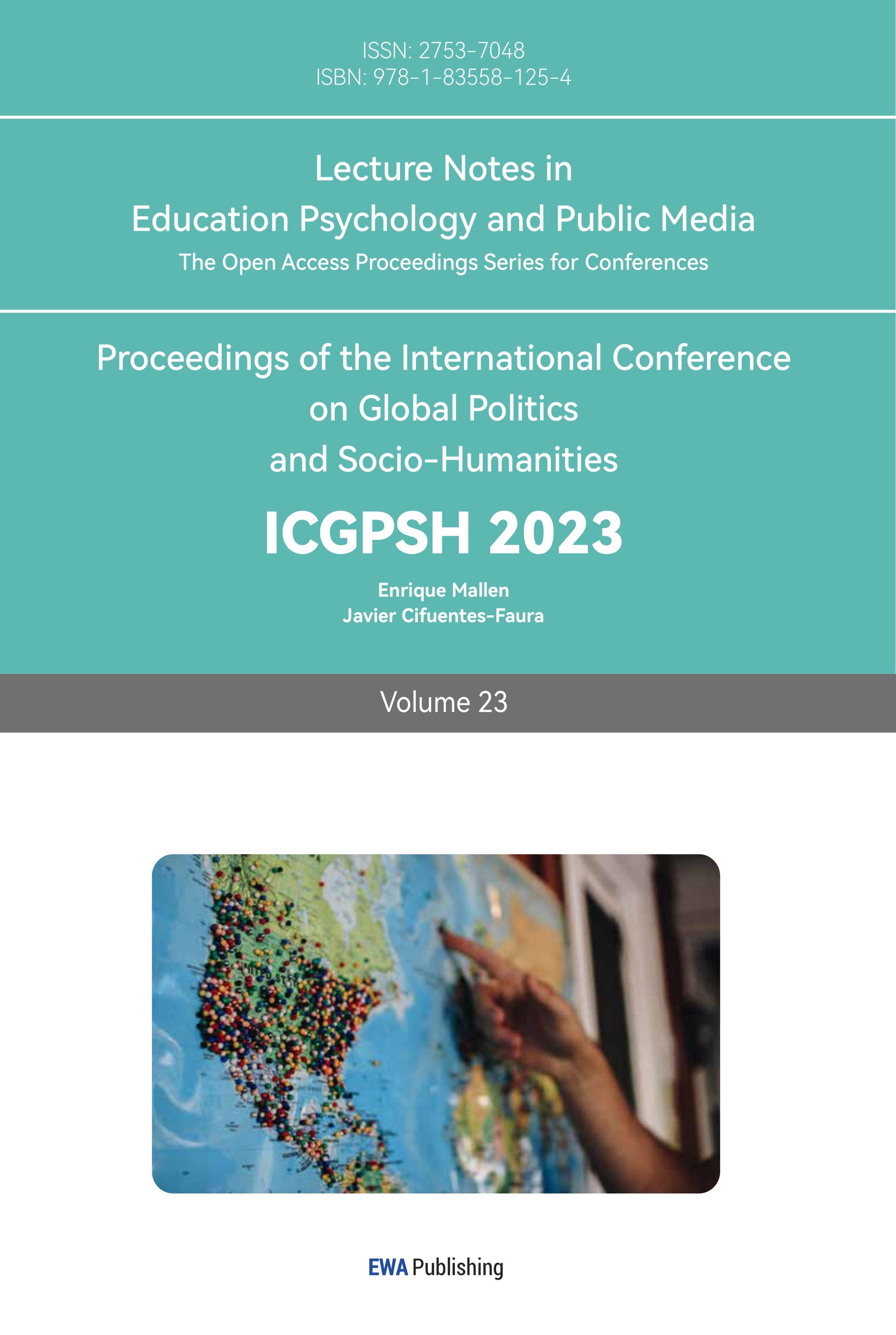References
[1]. Aitken, C., & Ersoy, E. (2023). War in Ukraine: The options for Europe’s energy supply. The World Economy, 46(4), 887-896. https://doi.org/10.1177/03000605221143284
[2]. Bazhal, M., & Koutchma, T. (2022). Ukraine as a food and grain hub: Impact of science and technology development on food security in the world. Frontiers in Food Science and Technology, 2, 1040396. https://doi.org/10.1080/07036337.2022.2109651
[3]. Borshchevskaya, A. (2023). Russia and the Kurds: A Soft‐Power Tool for the Kremlin? Middle East Policy. https://doi.org/10.3389/fpubh.2022.904588
[4]. Boulton, F. (2022). The nature and consequences of a nuclear war: lessons for prevention from Ukraine 2022. Medicine, conflict and survival, 38(3), 184-202. https://doi.org/10.1080/00263206.2020.1775590
[5]. Mallory, C. (2020). Confronting Human Rights Violations in Ukraine: Some Legal and Practical Challenges. Human Rights in War, 1-16. https://doi.org/10.1080/25739638.2023.2194137
[6]. Morris, J. (2023). Political ethnography and Russian studies in a time of conflict. Post-Soviet Affairs, 39(1-2), 92-100. https://doi.org/10.1007/978-981-15-5202-1_15-1.pdf
[7]. Pang, A., Jin, Y., & Cameron, G. T. (2023). The Contingency Theory of Strategic Conflict Management: Review From Three Decades of Theory Development, Extension, and Application. Journalism & Communication Monographs, 25(2), 193-214. https://doi.org/10.1080/1060586X.2022.2151275
[8]. Pardo, R. P., & Kim, S. (2023). South Korea: siding with the west and distancing from Russia. International Politics, 1-21. https://doi.org/10.1080/14760584.2022.2067147
[9]. Rezvani, B. (2020). Russian foreign policy and geopolitics in the Post-Soviet space and the Middle East: Tajikistan, Georgia, Ukraine and Syria. Middle Eastern Studies, 56(6), 878-899. https://doi.org/10.7326/m22-2309
[10]. Ruslan, K., Inshyn, M., Hryshyna, Y., Hubska, O., & Yurovska, V. (2023). History of the origin and development of the trade union movement in Ukraine. Cogent Arts & Humanities, 10(1), 2173553. https://doi.org/10.1080/13623699.2022.2093571
Cite this article
Yang,Y. (2023). Understanding the Roots of the Russo-Ukrainian Conflict and Its Global Economic Implications. Lecture Notes in Education Psychology and Public Media,23,273-278.
Data availability
The datasets used and/or analyzed during the current study will be available from the authors upon reasonable request.
Disclaimer/Publisher's Note
The statements, opinions and data contained in all publications are solely those of the individual author(s) and contributor(s) and not of EWA Publishing and/or the editor(s). EWA Publishing and/or the editor(s) disclaim responsibility for any injury to people or property resulting from any ideas, methods, instructions or products referred to in the content.
About volume
Volume title: Proceedings of the International Conference on Global Politics and Socio-Humanities
© 2024 by the author(s). Licensee EWA Publishing, Oxford, UK. This article is an open access article distributed under the terms and
conditions of the Creative Commons Attribution (CC BY) license. Authors who
publish this series agree to the following terms:
1. Authors retain copyright and grant the series right of first publication with the work simultaneously licensed under a Creative Commons
Attribution License that allows others to share the work with an acknowledgment of the work's authorship and initial publication in this
series.
2. Authors are able to enter into separate, additional contractual arrangements for the non-exclusive distribution of the series's published
version of the work (e.g., post it to an institutional repository or publish it in a book), with an acknowledgment of its initial
publication in this series.
3. Authors are permitted and encouraged to post their work online (e.g., in institutional repositories or on their website) prior to and
during the submission process, as it can lead to productive exchanges, as well as earlier and greater citation of published work (See
Open access policy for details).
References
[1]. Aitken, C., & Ersoy, E. (2023). War in Ukraine: The options for Europe’s energy supply. The World Economy, 46(4), 887-896. https://doi.org/10.1177/03000605221143284
[2]. Bazhal, M., & Koutchma, T. (2022). Ukraine as a food and grain hub: Impact of science and technology development on food security in the world. Frontiers in Food Science and Technology, 2, 1040396. https://doi.org/10.1080/07036337.2022.2109651
[3]. Borshchevskaya, A. (2023). Russia and the Kurds: A Soft‐Power Tool for the Kremlin? Middle East Policy. https://doi.org/10.3389/fpubh.2022.904588
[4]. Boulton, F. (2022). The nature and consequences of a nuclear war: lessons for prevention from Ukraine 2022. Medicine, conflict and survival, 38(3), 184-202. https://doi.org/10.1080/00263206.2020.1775590
[5]. Mallory, C. (2020). Confronting Human Rights Violations in Ukraine: Some Legal and Practical Challenges. Human Rights in War, 1-16. https://doi.org/10.1080/25739638.2023.2194137
[6]. Morris, J. (2023). Political ethnography and Russian studies in a time of conflict. Post-Soviet Affairs, 39(1-2), 92-100. https://doi.org/10.1007/978-981-15-5202-1_15-1.pdf
[7]. Pang, A., Jin, Y., & Cameron, G. T. (2023). The Contingency Theory of Strategic Conflict Management: Review From Three Decades of Theory Development, Extension, and Application. Journalism & Communication Monographs, 25(2), 193-214. https://doi.org/10.1080/1060586X.2022.2151275
[8]. Pardo, R. P., & Kim, S. (2023). South Korea: siding with the west and distancing from Russia. International Politics, 1-21. https://doi.org/10.1080/14760584.2022.2067147
[9]. Rezvani, B. (2020). Russian foreign policy and geopolitics in the Post-Soviet space and the Middle East: Tajikistan, Georgia, Ukraine and Syria. Middle Eastern Studies, 56(6), 878-899. https://doi.org/10.7326/m22-2309
[10]. Ruslan, K., Inshyn, M., Hryshyna, Y., Hubska, O., & Yurovska, V. (2023). History of the origin and development of the trade union movement in Ukraine. Cogent Arts & Humanities, 10(1), 2173553. https://doi.org/10.1080/13623699.2022.2093571









